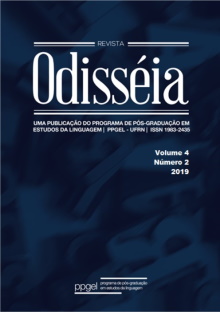Nomadism as an aesthetic function in Lima Barreto’s short stories
DOI:
https://doi.org/10.21680/1983-2435.2019v4n2ID18297Keywords:
Short stories, Aesthetics, Lima Barreto, NomadismAbstract
From Francisco de Assis Barbosa, in the 1950s, to scholars, such as Sevcenko (1985), Resende (2004) and more recently Schwarcz (2017), critical studies on Lima Barreto’s oeuvre have categorized it as a socially engaged writing, especially in relation to ideological and racial issues. This paper aims to analyze Barreto’s literary output under the approach of nomadism, which explains the existence of approximation and rejection in his work to different social groups, such as the black, the suburban, the academy, etc. This paradox cannot be explained by cultural criticism because the author and his work would be placed in an ideological web in which the aesthetic aspects of the text are not observed. In this sense, this article defines and analyzes the aesthetic resources used in Lima Barreto’s short stories as the first element of the investigation; then, the semantic and contextual analysis is carried out, and, finally, the material under analysis is explained in the light of Flusser’s idea of nomadism (2007). It is possible to infer that the aesthetic elements analyzed herein suggest displacements of values and the assumption of others — this nomadic approach fulfills a function: art is an element of communion among men, because when it is detached from values considered eternal, such as identity and social class, prejudices are also eliminated. In light of this, his writing is fluid; it is not fixed — culturally or socially — at a specific point. It moves like a nomad who needs to cut off ties with ideological sectarianism and keep distant from social groupings in order to better observe their paradoxes: what is at issue is not a social flag, but an aesthetic defense.
Downloads
Downloads
Published
How to Cite
Issue
Section
License
Thisa work has been licensed under Creative Commons - Atribuição - NãoComercial - CompartilhaIgual 3.0 Não Adaptada.


















